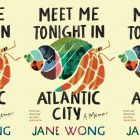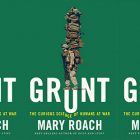True Love by Sarah Gerard

True Love
Sarah Gerard
HarperCollins | July 7, 2020
Nina might be in a trance. Her hypnotist warns her of this during a session at the beginning of Sarah Gerard’s new novel, True Love. They’re trying to unpack Nina’s “unnamable trauma,” her “deep intuition that something is wrong with [her].” As the hypnotist describes it, a trance is a “story in which you become so absorbed you can’t see anything else.” For example, love is a trance. When we’re in a trance, the hypnotist explains, it “shapes what we see and how we respond . . . it’s debatable whether we even have full use of our judgment or our faculties.”
If the hypnotist is right, it might explain some of Nina’s recent behavior. Nina certainly has issues exercising her judgment. Although she seems to have a pathological need to be in relationships, she’s also a compulsive cheater. Nina has a specific type: she’s drawn to the kind of millennial man-boy who gets a tattoo of Hokusai’s Great Wave on his shoulder and ties his hair in a man bun. The kind who dishes out lines like: “I explore open space in painting, in particular the oppositional forces caught in the openness of absence.” Although Nina mostly has contempt for these man-boys and their pretensions, she also can’t stop winding up with them. At the start of True Love, she has just finished rehab in St. Petersburg, Florida, and is stuck in a frustrating relationship with Seth, a pretentious wannabe artist who makes installations out of his trash. Yet she’s also sleeping with Brian, a journalist at a local paper, and entertaining the idea of starting a relationship with Jared, Seth’s best friend, who’s helping her polish a manuscript to apply for MFA programs in New York City.
Nina’s love life, in other words, is complicated.
Gerard has an unusual way of depicting Nina’s romantic travails. Her prose is invariably muted, laconic, written with an acerbic deadpan that runs counter to Nina’s baroquely self-destructive behavior. (“I moved to New York for college. I stole Adderall from my suitemate. I fucked her boyfriend on a weekly basis. I fucked people without condoms. I especially liked men who already had girlfriends.”) Although Nina is the narrator of True Love, she spends very little time actively reflecting on her own misdeeds; the novel has a churning, forward momentum and Nina functions more as an impartial observer. “I feel like my life is mocking me,” she tells an analyst at one point. “I watch myself doing things and I don’t know why. I don’t even recognize myself. I don’t know who this is inside my body.”
In a New Yorker essay published this past January—“Can a Novel Capture the Contradictions of Female Desire?”—Sarah Resnick describes a spate of recent novels that feature “women raring to assert their agency in one context, then willing, even eager, to relinquish it in another.” As examples of this, Resnick cites Miranda Popkey’s Topics of Conversation, Sally Rooney’s Conversations with Friends and Normal People, and Phoebe Waller-Bridge’s TV series Fleabag. Each of these stories centers around a protagonist who behaves “in ways that are harmful to people they care about.” They cheat on lovers, browbeat friends, and lust after violent, domineering sex partners. “What kind of person am I, they worry, to be so self-contemptuous, so bent on self-defeat?” Resnick ties this impulse to the way we live on the internet today. Online, we have total control over what we present to others. “To be online is to craft—and control—a persona, however deliberate, however fussed over, however much it resembles (or not) one’s I.R.L. self.” Navigating the online-offline divide, for these narrators, leads to chaos, self-defeating behavior, and unnamable trauma, and puts them in a kind of trance.
In accordance with Resnick’s essay, True Love, like Rooney’s Normal People or Waller-Bridge’s Fleabag, is also deeply influenced by our technological present. One of the book’s innovative features is how it depicts Nina’s text-message exchanges in a bold font, differentiated from the quoted dialogue. In any given scene, Nina’s consciousness is always triangulated, shifting between herself, her dialogue partner in the room, and a third party with whom she’s communicating via text message. This stylistic innovation brilliantly captures the way contemporary technology bifurcates our brains into different conversational tracks, one running in the real world and the other running virtually. When she’s texting or sexting, Nina’s desires are given free rein, often in hilarious contrast to the mundane reality she’s inhabiting at the moment.
Yet True Love is at its most original and interesting where it diverges from Resnick’s analysis and begins exploring the trials and tribulations of America’s “precariat” class. Toward the latter half of the novel, Nina and Seth move to New York, where Nina completes an MFA in Creative Writing. After finishing her degree, Nina is forced to earn a living in the dog-eat-dog world of Brooklyn bohemia. She starts cheating on Seth with an old friend, Aaron, with whom she falls in love with while writing a screenplay called True Love. (“It follows a group of troubled, narcissistic young people as they become entangled in a series of ill-conceived relationships that flame out in humiliating ways.”) Nina dumps Seth and, thinking it will aid their search for a new apartment, marries Aaron in a rushed ceremony at Brooklyn city hall.
As a full-time member of the gig economy, Nina barely makes ends meet. “I work forty hours a week for an annual income of $25,000. Aaron is paid a hundred dollars a day for occasional three-week gigs of twelve-hour workdays on movie sets.” As the primary breadwinner in this arrangement, Nina starts to resent Aaron’s inability to find steady work, as well as his dependence on his parents in Staten Island for his daily sustenance. Over time, this dynamic drives a wedge between them, and Aaron responds by growing at once boyishly clingy and emotionally abusive. This section of the novel thrums with tension, and Gerard captures the dynamic of a failing relationship with lacerating honesty—made all the worse by the challenges of working freelance in the dystopian era of late-stage capitalism. America’s eroding safety net reverberates across Nina’s subconscious for the rest of the novel.
True Love ends in 2016, with the apocalyptic dawn of the Trump era looming on the horizon. On the night of the election, Aaron and Nina have a spectacular falling out. Aaron, Nina realizes, is a “shart stain on the tighty-whities of humanity . . . a prepubescent Boy Scout who’s never controlled an erection.” The vitriol she’s been directing inward the whole novel finally gets directed outward, and it functions as a moment of spectacular, cathartic release. As the United States begins its nightmarish term under the thumb of a racist, misogynist, gangster autocrat, Nina finally obtains some purchase over her self-defeating impulses. She leaves the emotionally stunted Aaron to begin an independent life in New York.
Gerard’s novel is a fascinating read for anyone looking to understand the world we’ll inhabit when the smoke of the Trump era clears—in particular, the world that’s being left to young people. It’s unclear, however, if True Love offers any hope. Maybe, the violent ending to Gerard’s novel suggests, it isn’t Nina who’s in the trance. Maybe it’s America.



